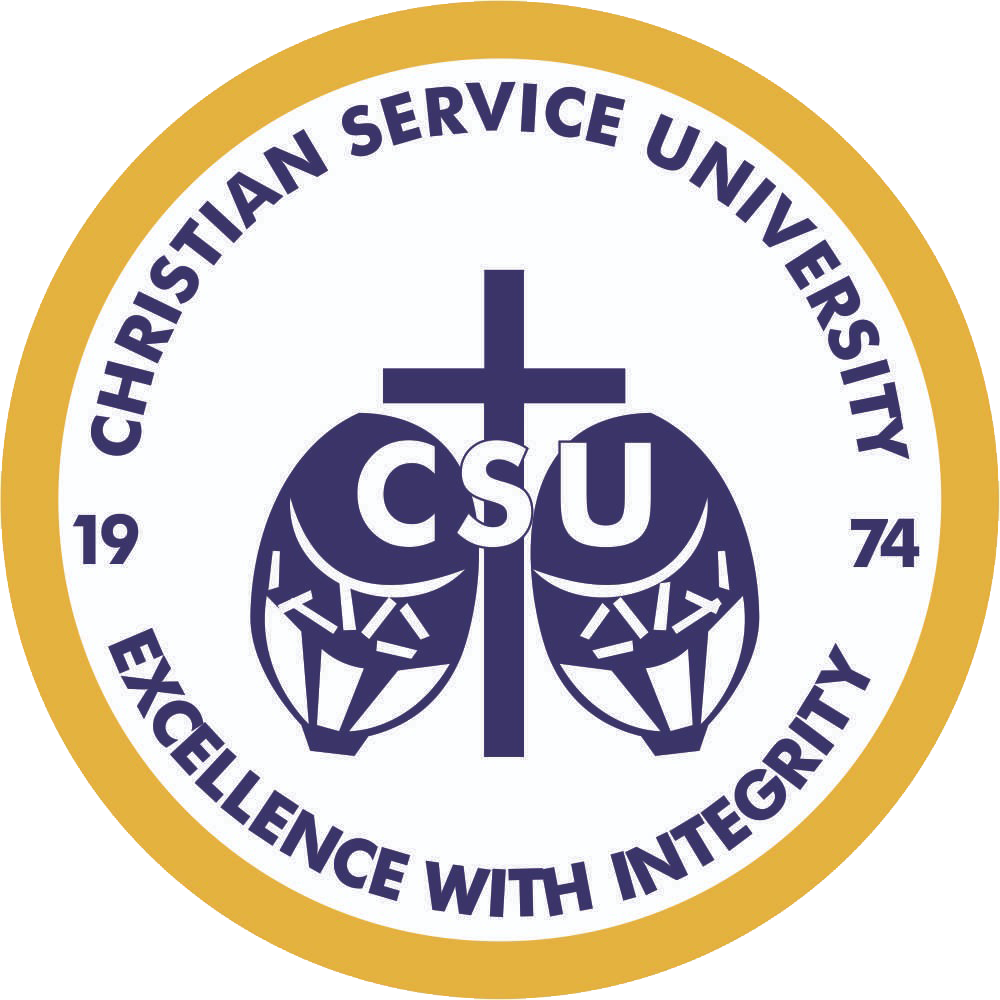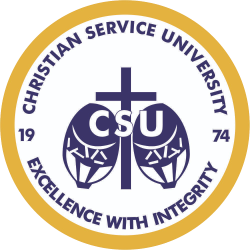Programme Objectives
- Infusion of biblical courses into professional training to ensure healthy moral education and spiritual development of students;
- Addressing the College’s vision and mission of training
- manpower for the Church and other para-church institutions. Expansion to cover business and computer science studies will also equip trainees in theology with the necessary management and computer skills to perform better;
- Filling the yawning market for secondary school graduates and workers who are desirous of pursuing business education at the degree level;
- Addressing its cardinal aim of training church workers and others in analogous positions, The turnout rate of business and science graduates from the business and science departments of secondary schools in the northern sector including Ashanti Region and its environs is so huge that many of those who qualify to go to the universities and polytechnics do not get admission. It is for this and other reasons that the Christian. Service University College (CSUC) wants to expand its academic programme further beyond Theology and Business studies to be able to address the problem of science students who do not get admission to pursue science related studies at the degree level.
Courses
First Year Semester 1 Courses
| CODE | SEMESTER 1 COURSES | CREDIT HOURS | ||
|
T |
P |
C |
||
| CSCP 177 | INTRODUCTION TO COMPUTER SCIENCE | 2 | 3 | 3 |
| CSCP 157 | PRINCIPLES OF PROGRAMMING | 2 | 3 | 3 |
| CSCP 175 | CALCULUS I | 3 | 1 | 3 |
| CSUC 101 | WRITING SKILLS I | 3 | 0 | 3 |
| CSUC 105 | RELIGION, MORALITY AND SOCIAL VALUES IN AFRICA | 3 | 0 | 3 |
| UGRC 131 | UNDERSTANDING HUMAN SOCIETIES | 3 | 0 | 3 |
| 16 | 7 | 18 | ||
Semester 2 Courses
| CODE | SEMESTER 2 COURSES | CREDIT HOURS | ||
| T | P | C | ||
| CSCP 184 | PROGRAMMING IN PYTHON | 2 | 3 | 3 |
| CSCP 174 | INTRO. TO PROBABILITY & STATISTICS | 3 | 1 | 3 |
| CSUC 102 | WRITING SKILLS II | 3 | 0 | 3 |
| UGRC 160 | INTRODUCTION TO LITERATURE | 3 | 0 | 3 |
| CSUC 106 | CRITICAL AND CREATIVE THINKING | 3 | 0 | 3 |
| CSCP 186 | CALCULUS II | 3 | 1 | 3 |
| 17 | 5 | 18 | ||
SECOND YEAR COURSES
Semester 1 Courses
| CODE | SEMESTER 1 COURSES | CREDIT HOURS | ||
|
T |
P |
C |
||
| CSCP 265 | DISCRETE MATHEMATICS | 3 | 1 | 3 |
| CSCP 263 | SYSTEMS ANALYSIS AND DESIGN | 2 | 3 | 3 |
| CSCP 259 | COMPUTER ORGANISATION AND ARCHITECTURE | 2 | 3 | 3 |
| CSCP 267 | PRINCIPLES OF ECONOMICS | 3 | 0 | 3 |
| CSCP 269 | PRINCIPLES OF ACCOUNTING | 3 | 0 | 3 |
| CSCP 271 | DIGITAL ELECTRONICS | 2 | 3 | 3 |
| CSCP 273 | OBJECT ORIENTED PROGRAMMING WITH JAVA | 2 | 3 | 3 |
| 17 | 13 | 21 | ||
Semester 2 Courses
| CODE | SEMESTER 2 COURSES | CREDIT HOURS | ||
|
T |
P |
C |
||
| CSCP 254 | DATABASE I | 2 | 3 | 3 |
| CSCP 276 | LEGAL AND ETHICAL ISSUES IN IT | 3 | 0 | 3 |
| CSCP 252 | OPERATING SYSTEMS | 3 | 1 | 3 |
| CSCP 264 | PROGRAMMING WITH VISUAL BASIC | 2 | 3 | 3 |
| CSCP 266 | FUNDAMENTAL OF WEB DESIGN | 2 | 3 | 3 |
| CSCP 274 | NUMERICAL METHODS & COMPUTATIONS | 3 | 1 | 3 |
| 15 | 11 | 18 | ||
THIRD YEAR COURSES
Semester 1 Courses
| CODE | SEMESTER 1 COURSES | CREDIT HOURS | ||
|
T |
P |
C |
||
| CSCP 351 | DATABASE II | 2 | 3 | 3 |
| CSCP 353 | HUMAN COMPUTER INTERACTION | 2 | 3 | 3 |
| CSCP 355 | OPERATIONS RESEARCH | 3 | 1 | 3 |
| CSCP 367 | COMPUTER MODELLING AND SIMULATION | 2 | 3 | 3 |
| CSCP 365 | DATA STRUCTURES AND ALGORITHMS I | 2 | 3 | 3 |
| CSCP 359 | WEB DESIGN AND APPLICATIONS | 2 | 3 | 3 |
| 13 | 16 | 18 |
Semester 2 Courses
| CODE | SEMESTER 2 COURSES | CREDIT HOURS | ||
|
T |
P |
C |
||
| CSCP 352 | INTRODUCTION TO COMPILERS | 2 | 3 | 3 |
| CSCP 356 | RESEARCH METHODS | 3 | 0 | 3 |
| CSCP 366 | DATA STRUCTURES AND ALGORITHMS II | 2 | 3 | 3 |
| CSCP 368 | SOFTWARE ENGINEERING | 2 | 3 | 3 |
| CSCP 370 | EMBEDDED SYSTEMS AND IOT | 2 | 3 | 3 |
| CSCP 372 | MACHINE LEARNING | 2 | 3 | 3 |
| CSCP 374 | MOBILE APPLICATIONS DEVELOPMENT | 2 | 3 | 3 |
| 15 | 18 | 21 | ||
FOURTH YEAR COURSES
| CODE | SEMESTER 1 COURSES | CREDIT HOURS | ||
|
T |
P |
C |
||
| CSCP 455 | DATA COMMUNICATIONS AND NETWORKS I | 2 | 3 | 3 |
| CSCP 457 | CLOUD COMPUTING | 2 | 3 | 3 |
| CSCP 467 | ENTREPRENEURSHIP | 3 | 0 | 3 |
| CSCP 471 | INTRODUCTION TO ARTIFICIAL INTELLIGENCE | 3 | 1 | 3 |
| CSCP 459 | STATISTICAL MODELS AND METHODS FOR DATA SCIENCE | 3 | 1 | 3 |
| CSCP 497 | PROJECT I | 3 | 0 | 3 |
| 16 | 8 | 18 | ||
| CODE | SEMESTER 2 COURSES | CREDIT HOURS | ||
| T | P |
C |
||
| CSCP 452 | INFORMATION SYSTEMS | 2 | 3 |
3 |
| CSCP 456 | IT/IS SECURITY & CONTROL | 2 | 3 |
3 |
| CSCP 462 | DATA COMMUNICATION AND NETWORKS II | 2 | 3 | 3 |
| CSCP 472 | COMPUTER GRAPHICS AND IMAGE PROCESSING | 2 | 3 | 3 |
| CSCP 454 | DATA MINING AND WAREHOUSING | 2 | 3 | 3 |
| CSCP 498 | PROJECT II | 3 | 0 |
3 |
| 13 | 15 |
18 |
||
Career Prospects
Generally, degree courses in computer science appear to be attractive to science students. It is worth noting that many graduates in the sciences and the arts who occupy responsible managerial positions are pursuing Master of Business Administration (Management Information Systems option), Master of Science in Information Technology, and Master of Science in Software Engineering and other analogous programmes in Computer Science.
High Standards of admission to Computer Science courses in the universities are clear indications of the overwhelming number of students who desire to pursue Computer Science courses at the universities.
A critical observation of advertisements on job vacancies in the daily newspapers reveals that many of the job vacancies are in areas such as Computer Science and other related courses in computing and business studies. Students who pursue courses in computer science and business are often better pre-disposed to get jobs than their counterparts in the non-business and non-computer courses.
There is therefore no doubt that candidates who get the opportunity to pursue Christian Service University College’s Bachelor of Computer Science programme stand a good chance of getting jobs on the job market. In case they would like to be entrepreneurs or self-employed, the course will give them the necessary skills and exposure.
Employers are interested in both the technical and the non-technical skills gained during your computer science/IT degree. Jobs directly related to your degree include:
- Database administrator.
- Games developer
- Information systems manager
- IT consultant
- Multimedia programmer
- Network engineer
- Systems analyst
- Systems developer
- Geographical information systems officer
- IT sales professional
- IT trainer
- Secondary school teacher
Duration of Programmes
- BSc. Computer science – 3 or 4 years.
- BSc. Information Technology 3 or 4 years
Entry Reqiurements
Admission is open to all who qualify as follows:
- Senior Secondary School Certificate Examination (SSSCE) Holders. Passes in THREE Core Subjects in English, Mathematics and Integrated Science or Social Studies plus passes in THREE Elective Subjects. – Candidates should have aggregate score not exceeding 24
- West African Senior Secondary Certificate Exams (WASSCE) Holders Credit Passes (AI-C6) in THREE Core Subjects in English, Mathematics and Integrated Science or Social Studies plus passes in THREE Elective Subjects. Candidates should have aggregate score not exceeding 36.
- Diploma Holders Diploma holders with FGPA of 3.0 or better from an institution whose diploma programme has been accredited by the NAB or from a foreign institution that is recognized by the NAB may be admitted to Level 100. In addition, applicant should have five (5) passes in GCE/W ASSCE/SSSCE including, Core Mathematics, Core English, and Core Integrated Science/ Agric Science/Social Studies.
- WAEC, ABCE/GBCE: Applicant must present passes from the General Business Certificate Examination (GBCE) and the Advanced Business Certificate Examination (ABCE). Applicant should have 5 Credit passes in the GBCE including English, Mathematics and Integrated Science/ Agric Science/Social Studies, plus 3 passes in the ABCE; one of the passes should be Grade D or better.
- HND Holders: HND holders must have a minimum of Second class (Lower division) in an IT-related or engineering field from NAB accredited or recognized institution. Applicants may be admitted to Level 200.
- General Certificate Of Education( GCE) Holders – Foreign Applicants Only. Applicants must have five credits in GCE “0”Level including English Language and Mathematics. Three passes in GCE “A”Level and a pass in General Paper.
- Mature Applicants: Applicant must be at least 25 years at the time of applying with or without SSSCE/ WASSCE / GCE “0”Level Certificates. Applicant must also pass a mature applicant entrance examinations. In relation to this the College shall in all instances be guided by the University of Ghana Mature Entrance examination and admission requirements.
- Applicant on Transfer From Another University: An applicant who has been enrolled as a regular student in a Bachelor’s Degree course in a recognized university and made satisfactory progress for at least one year may be considered for admission, on presentation of authenticated academic records and the names of two references.

